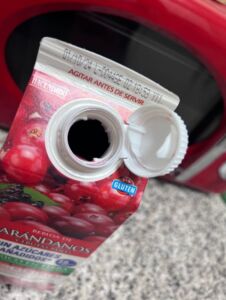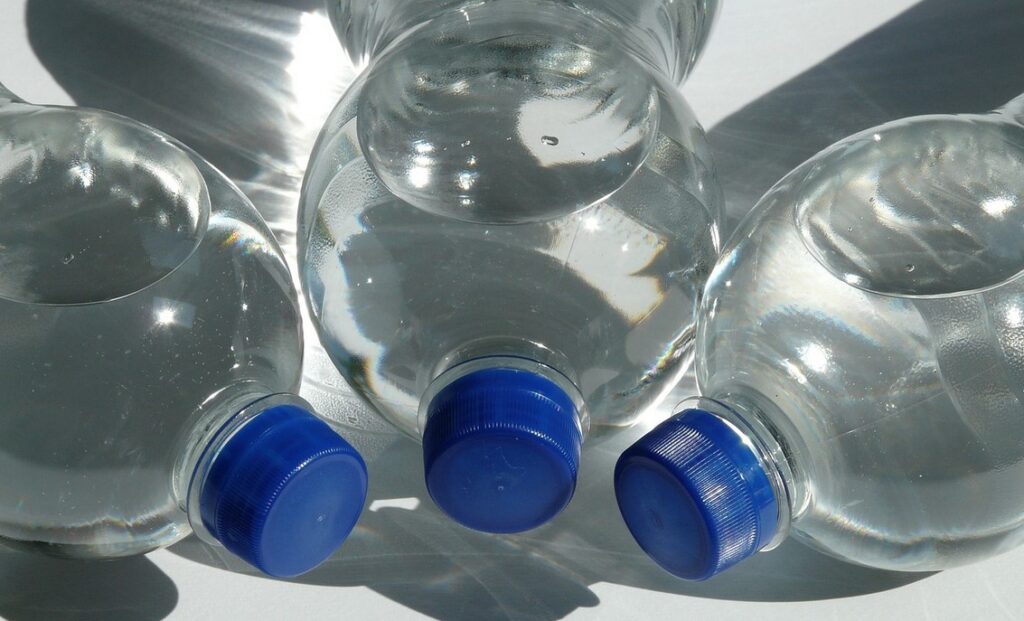Bottled Up
A new trend has emerged in the country where I live. Maybe it has been going on for quite some time elsewhere, but it’s advent in my neck of the woods is recent.
I am, of course, talking about the sudden (for me at least) prevalence of bottle caps which are attached to the bottle. Milk, juice, pop, energy drinks . . . all now come with caps that cling to the bottle with a stubborn fortitude.
These fixed bottle caps are designed to make it easier to recycle the bottle. I know this because the caps told me.
Far be it from me to doubt the methods and intentions of PepsiCo, but that sounds like bull crap.

You shouldn’t be drinking these sugary beverages, anyway. I purchased these products for research purposes only.
Being part Irish and part Italian, I’ve inherited the genetic traits that enable a long memory — how else can you bear generational grudges without one? — and I remember the days when we were specifically instructed to remove bottle caps from plastic bottles in order to facilitate the recycling process. Apparently there have been advances in recycling technology and now recycling plants are able to take those erstwhile unrecyclable caps and do whatever it is recycling plants do to in order to make plastic reusable.
This about-face and the sudden, ubiquitous appearance of attached bottle caps made me reminisce about the what I lazily call The Covid Years: that period of time roughly starting in 2020, reaching its dizzying peak of madness in 2021, then at some point in 2022 vanishing slowly and softly like dried dandelion seeds in the wind.
At the start of The Covid Years, the same supermarkets and corner shops where these plastic bottles with attached caps now line the shelves suddenly were emblazoned with arrows on the floor directing you to walk in the direction they indicated — for your health, of course. Overnight, “protective” plexiglass barriers, which are still up in many locales, began separating cashier and shopper at the check-out counters. I never saw anyone putting up those plexiglass screens or sticking those arrows on the floor or installing the hand sanitizer on the walls of so many buildings. They just appeared. Obviously, I’m sure a crew of employees or some other team of laborers did the work during closing time, but the speed with which it was all set up was astonishing.
These attached caps also make it awkward to drink out of the bottle, but the decision has been made for us that this is the way bottles come now. If you don’t like it, you’re out of luck. In complex, post-industrial societies, so many decisions are made for us. Apart from a bottle of Pepsi, little else is actually in our hands. When directives come down from on high, we have no choice but to comply with them. I wouldn’t be surprised if both big companies such as PepsiCo and comparatively smaller companies such as the ones that supply milk to local supermarkets conformed to the idea of attached bottle caps because a higher environmental, social, and governance (ESG) score was the promised reward.
The average person is increasingly removed from what Ted Kaczynski called “the power process.” Changes in the industrial society are imposed upon us. We aren’t free to do anything other than adapt to and comply with them. Obedience, in fact, is the most cherished and valued trait in modern man. And sooner or later, everyone obeys. Like bottles with attached caps, there might be a sudden and relatively minor change to which the citizens must adapt. It might be the reduction of speed limits on a motorway. Kaczynski wrote about this as well, in Industrial Society and Its Future:
When motor vehicles were introduced they appeared to increase man’s freedom. They took no freedom away from the walking man, no one had to have an automobile if he didn’t want one . . . But the introduction of motorized transport soon changed society in such a way as to restrict greatly man’s freedom of locomotion . . . [O]ne cannot just go where one likes at one’s pace; one’s movement is governed by the flow of traffic and by various traffic laws. One is tied down by various obligations . . . Moreover, the use of motorized transport is no longer optional.

You can buy Jonathan Bowden’s collection The Cultured Thug here.
The last line is key. You can hold out for as long as possible, but eventually these changes become not only impositions, but obligations. I’m reminded of how long I went without owning a smartphone. Nowadays, not only is a smartphone a necessity, in many cases it is a requirement. Kaczynski called this “learned dependence.”
Traffic regulations, having to own a smartphone, and bottles with attached caps may seem like small things, but enough small things all piled up amount to a rather big thing. The “visionaries” at Davos are no longer boisterously talking about the need for a “great reset” and gleefully divulging their plans to ensure that we own nothing and are happy, but their plans are no less in effect. At the recent World Economic Forum, a panel of luminaries again waxed urgently about the need for digital biometric IDs that show if you’ve had the correct vaccinations in order to open bank accounts, access schools, and more.
Simply put, we are not autonomous anymore. Our ability to make decisions, particularly spontaneous ones, is restricted so severely yet so artfully that we don’t even notice. For all the guff about Our Democracy and The Will of the People, it turns out that neither matter all that much. The People are a mishmash of ideologically and economically antagonistic competitors, and in most Western countries there is a significant portion of the People who are a fifth column of foreign malcontents. Their will can be manipulated through constant and sophisticated propaganda, or ignored entirely. As The Covid Years showed us, most people will employ that most desirable characteristic in order to be a successful member of society – obedience — and do whatever they are told.
Whether or not that’s a good thing, I’ll leave you to exercise a bit of freethinking and decide for yourself.







